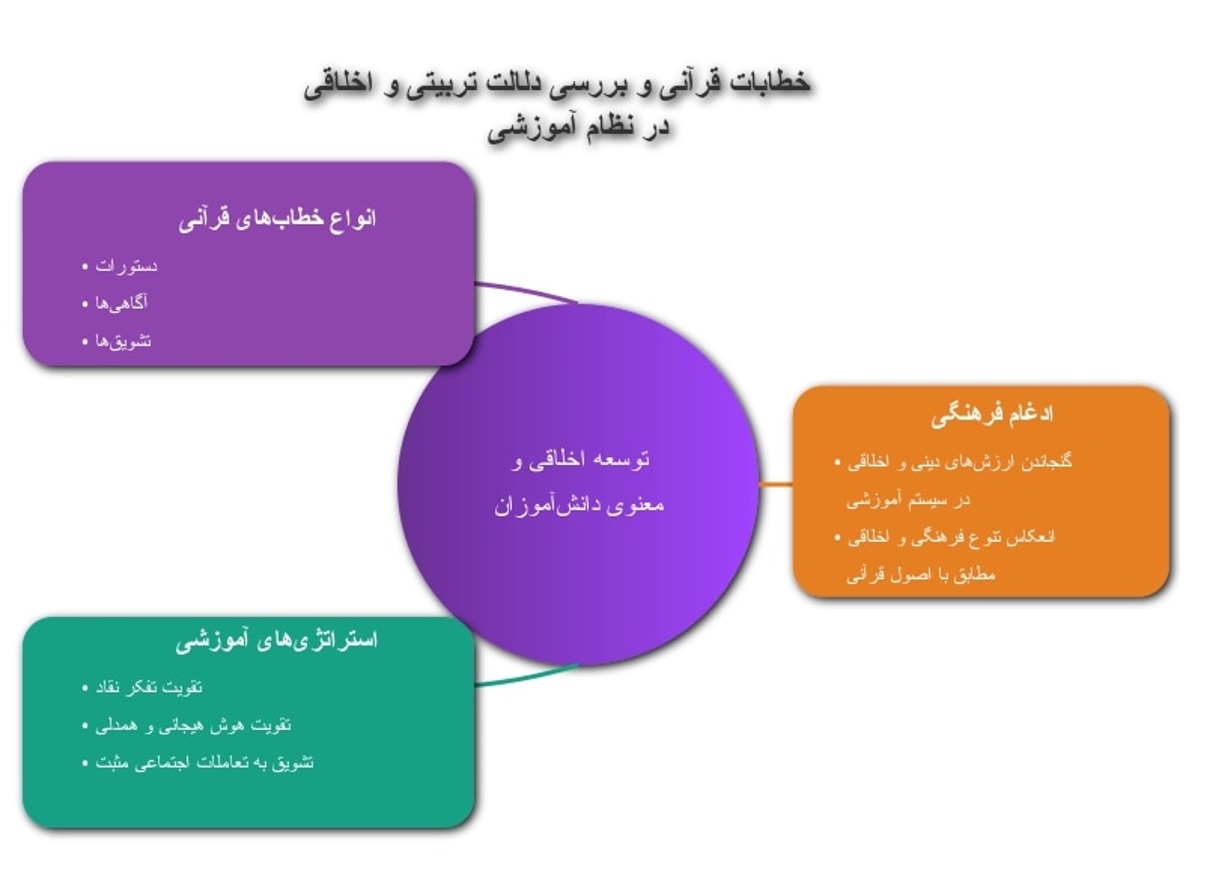تحلیل خطابهای قرآنی و بررسی دلالتهای تربیتی آنها در نظام آموزشی
کلمات کلیدی:
خطابهای قرآنی, دلالتهای تربیتی, نظام آموزشی, تحلیل محتوا, تربیت اسلامیچکیده
از مؤلفههای اصلی فرهنگ دینی و قرآنی که تأثیر بسزایی در فرایند تربیت فردی و اجتماعی انسانها دارند خطابهای قرآنی میباشد. با تدبر در قرآن کریم هر آیهای که مشتمل بر خطاب است دارای حکمتی قابل تحلیل است، لذا این خطابها دارای ابعاد متنوعی از جمله توجه به نیازهای روانشناختی، اجتماعی و معنوی افراد هستند که میتواند در ارتقاء نظام آموزشی مورد استفاده قرار گیرد. هدف از این پژوهش، تحلیل دلالتهای تربیتی خطابهای قرآنی و بررسی چگونگی بهرهگیری از آنها در نظام آموزشی برای ارتقاء کیفیت تربیت دانشآموزان است. مطالعه حاضر از نوع توصیفی-تحلیلی است که با استفاده از ابزار کتابخانهای و با بهرهگیری از تحلیل محتوای کیفی و بررسی منابع ثانویه، به شناسایی و تحلیل دلالتهای تربیتی نهفته در خطابهای قرآنی پرداخته است. نتایج نشان میدهد که خطابهای قرآنی حاوی مضامینی همچون تشویق به تفکر و تعقل، تأکید بر عدالت و انصاف، دعوت به خودشناسی و خداشناسی و اهمیت روابط اجتماعی سالم و سازنده هستند. این دلالتها میتوانند بهعنوان مبانی اساسی در طراحی برنامههای آموزشی و تربیتی مدارس مورد استفاده قرار گیرند. بهرهگیری از دلالتهای تربیتی خطابهای قرآنی میتواند به تقویت مهارتهای فکری و اخلاقی دانشآموزان منجر شود و فرهنگ تربیتی مؤثری در نظام آموزشی ایجاد نماید. لذا پیشنهاد میشود که در طراحی برنامههای درسی، توجه بیشتری به این دلالتها شود و دورههای آموزشی ویژهای برای معلمان تدارک دیده شود تا توانایی پیادهسازی این آموزهها را داشته باشند.
دانلودها
مراجع
Collection of Speeches by the Supreme Leader.
Mo'in M. Mo'in Persian Dictionary. Tehran: Amir Kabir Publications; 1985.
Dehkhoda AA. Dehkhoda Dictionary and Persian Lexicon. Tehran: Tehran University Publishing Institute; 1994.
Zabidi MMMiYqF. Taj al-Arus min Jawahir al-Qamus (The Crown of the Bride from the Jewels of the Dictionary).
Beirut1800.
Ibn Manzur MiM. Lisān al-ʿArab (The Tongue of the Arabs). Beirut: Dar Ihya' al-Turath al-Arabi; 1801.
Ragheb Isfahani Aa-QHbM. Mufradat Alfaz al-Quran (The Vocabulary of the Quran). Tehran: Nasr-e Khusraw
Publications; 1984.
Mostafavi H. Al-Tahqiq fi Kalimat al-Quran al-Karim. Translated and summarized by Sadegh Abbasi ed. Tehran:
Ministry of Culture and Islamic Guidance; 2020.
Ghasemi MJ. Discourse and Address Culture in the Holy Quran. Isfahan: Adab-e Emrooz; 2010.
Al-Amoush K. Al-Khitab al-Qurani (The Quranic Discourse). Jordan: Modern World of Books, Al-Amoush; 2005.
Ghazi Askar S. Analysis of the Addresses 'O You Who Have Believed' in the Holy Quran with Emphasis on Social
Teachings: Alzahra University; 2017.
Shahsavandi S, Khanehzad O. Linguistics of Address in the Quran. Quarterly Journal of Quranic Research.
;18(2):82-98.
Najafi A. Explaining the Foundations of Address Recognition in the Holy Quran and Its Educational Implications in
Relation to Students and Teachers. Tehran: Allameh Tabataba'i University; 2021.
Sohani A, Amiri Qaemi A, Vakili N, Ahangaran K. Explaining the Role of Educators and Parents in Deepening
Religious Beliefs in Children with a Quranic Approach. Quarterly Journal of Quranic Studies. 2017;8(30):67-86.
Rahnama A, Alavi R, Zolfi Nasab M, editors. Review and Explanation of Educational Principles and Methods from
the Perspective of Imam Khomeini. Proceedings of the National Conference on Imam Khomeini and Education; 2012
December 2012; Tehran.
Eskandari MR, editor The Status of Education from the Perspective of the Supreme Leader. Second Congress on
Culture and Religious Thought; 2015 June 2015; Tehran.
Shamkhani A, Nouralian Y, Ashouri M, Malmir S. Principles of Educational Methods from Imam Khomeini's
Perspective. Quarterly Journal of Insight and Islamic Education. 2014;11(29).
Farzi Shoub M, Farzi Shoub F, Shah Ghasemi Z. Principles of Audience Recognition from Imam Ali's Perspective in
Nahj al-Balagha. Scientific-Research Quarterly of Seraj Monir. 2014;5(16):67-85.
Safavi A. General Teaching Methods and Techniques. Tehran: Moaser Publications; 2008.
Shiri Vasiq A. An Analysis of New Religious Education Methods for Students from the Perspective of Education
Experts. Education Organization of Hamadan Province; 2013.
Mahmoudi J. Cultural Education with an Islamic and Alawi Approach: Payam Noor University, Hamadan Branch;
Amiri M, Safari AA. Productive Planning from the Perspective of the Quran with Emphasis on the Managerial Model
of Prophet Yusuf (Joseph). Biannual Scientific-Research Journal of Quran and Science. 2022:156-77.
Iranpour E. Discourse and Address Culture in the Holy Quran. Tehran: Adab-e Emrooz; 2010.

دانلود
چاپ شده
ارسال
بازنگری
پذیرش
شماره
نوع مقاله
مجوز
حق نشر 2024 نشریه پژوهش و نوآوری در تربیت و توسعه

این پروژه تحت مجوز بین المللی Creative Commons Attribution-NonCommercial 4.0 می باشد.










